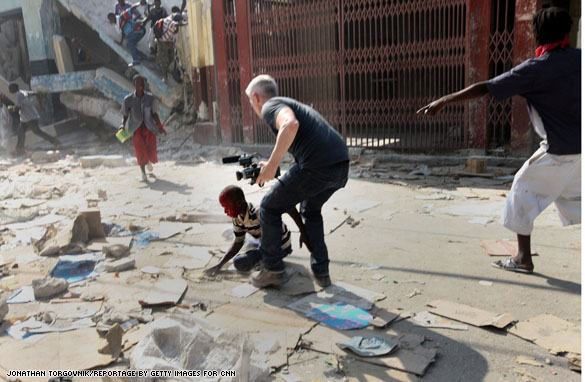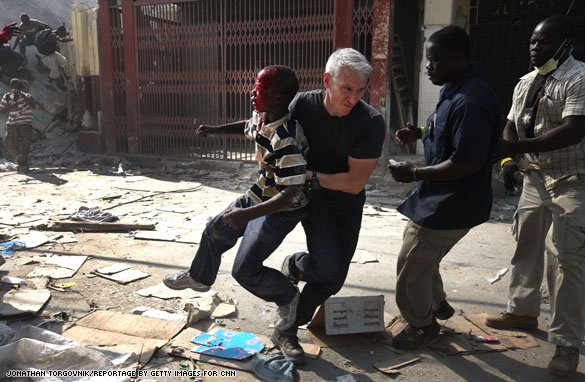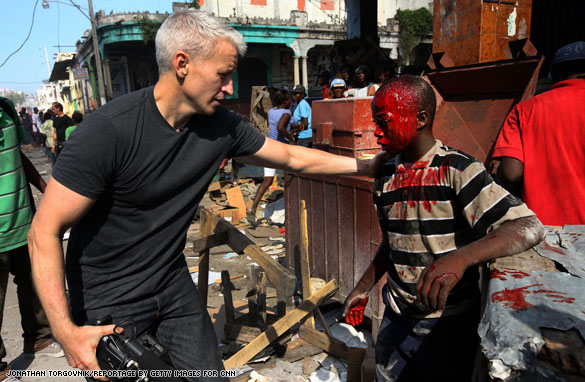...THE CARIBBEAN Community’s emergency aid mission to Haiti, comprising Heads of Government and leading technical officials, failed to secure permission Friday to land at that devasted country’s aiport, now under the control of the United States.
Consequently, the Caricom ’assessment mission’, that was to determine priority humanitarian needs resulting from the mind-boggling earthquake disaster of Haiti last Tuesday, had to travel back from Jamaica to their respective home destinations..
On Friday afternoon the US State Department confirmed signing two ’Memoranda of Understanding’ with the Government of Haiti that made ’official that the United States is in charge of all inbound and outbound flights and aid off-loading...’
Further, according to the agreements signed, US medical personnel ’now have the authority to operate on Haitian citizens and otherwise render medical assistance without having to wait for licences from Haiti’s government...’
Prior to the US taking control of Haiti’s airport, a batch of some 30 Cuban doctors had left Havana, following Wednesday’s earthquake, to join more than 300 of their colleagues who have been working there for more than a year. ...
http://www.trinidadexpress.com/index.pl ... =161583443Frustration mounts over Haiti aid
Desperately needed aid is still not reaching large swathes of the population [Reuters]Tensions are rising on the streets of Haiti as the bulk of earthquake survivors continue to go without food, medicine or proper shelter.
Aid organisations continued to struggle to reach them with supplies on Sunday, six nights after the devastating earthquake that killed tens of thousands of people and left hundreds of thousands homeless.
A bottleneck at the capital's small airport – the main entry point for the massive assistance pledged by world leaders following the disaster – means little help has reached the many people waiting for help in makeshift camps on streets strewn with debris and decomposing bodies.
Airport bottleneckSome aid agencies have complained about a lack of co-ordination at the Port-au-Prince airport, where the US military has taken over operations.
Medecins Sans Frontieres, or Doctors Without Borders, (MSF) said an aircraft carrying a mobile hospital was denied permission to land at the airport on Saturday and diverted to neighbouring Dominican Republic, where it would take a further 24 hours to deliver supplies by road.
"Priority must be given immediately to planes carrying lifesaving equipment and medical personnel," MSF said in a statement.
Al Jazeera's Teresa Bo, reporting from Port-au-Prince, said quake survivors in the capital were growing increasingly frustrated over what appeared to be the mismanagement or miscommunication that was holding up the aid.
In the absence of large scale foreign help, Haitians were trying to help each other, our correspondent said, with some turning homes into hospitals to treat the wounded and others giving away food, but food supplies and other resources were running out.
People could see helicopters flying overhead, US military vehicles in the city and aeroplanes arriving at the airport with supplies, so it was difficult to understand why little aid appeared to be reaching the people, she said.Meanwhile the European Union pledged over $575m in emergency and long-term aid, the bloc said on Monday.
The union is also moving towards sending 150 people to assist the police force and help beef up security, as tensions in the Caribbean nation rise.
US defends positionThe US military said on Sunday that it was doing its best to get as many aircraft as possible into Port-au-Prince.
The airport's control tower was knocked out by the quake and US military air controllers were operating from a radio post on the airfield grass, he said.
"What we set up here would be similar to running a major airport ... without any communications, electricity or computers," Colonel Buck Elton, the US commander at the airport, told reporters by telephone.
He said there had been 600 take-offs and landings since his crew took over operations at the one-runway airport's traffic on Wednesday, and 50 flights had been diverted.
But the flow of air traffic was improving, he said, with only three of 67 incoming flights being rerouted on Saturday, and only two flights diverted on Sunday.
'Efficiency increased'Speaking to Al Jazeera, PJ Crowley, a spokesman for the US state department, defended the US handling of Haiti's airport and international aid.
He said
changes in airport procedures "to increase efficiency and effectiveness", as well as "a technical reason", were possible reasons why some aeroplanes were not allowed to land.Pointing out that the US military had, by adding to the infrastructure of the airport, increased flights from 20 a day to 60 a day, he said whatever limited infrastructure Haiti had before the quake was devastated by the quake and it had taken time to "maximise the flow of everything that Haiti needs".
On claims that military aeroplanes with troops were being allowed to land while those carrying aid supplies were not, he said that was "absolutely not true".
"They are bringing in aid, communications gear for the Haitian government so they can begin to operate and function once again," he said.
Not only food, water, healthcare, he said, but also "the kinds of gear that allows us to save lives, to bring in capacity so that they can establish an effective network to distribute food among the three million people in the city".
Signs of progressThere were some signs of progress on Sunday as international medical teams took over damaged hospitals and clinics where injured and sick people had lain untreated for days.
Aid trucks set out from the airport but were soon blocked by clogged streets [AFP]
A few street markets had begun selling vegetables and charcoal in the capital and US officials said international search teams had rescued at least 61 people alive so far.
Hundreds of trucks carrying aid and guarded by armed UN patrols streamed from the airport and UN headquarters out into the city on Sunday but they were soon obstructed on streets clogged with people, debris and vans carrying coffins and bodies.
There were also scrums for food and water as UN trucks distributed food packets and US military helicopters dropped boxes of water bottles and rations.
Ban Ki-moon, the UN secretary general, who visited Port-au-Prince on Sunday, said the situation in the country was "one of the worst humanitarian crises in decades".
Amid shouts of "where is the food? Where is the help?" from survivors and asked if he feared riots over the delays in aid, Ban appealed to the Haitian people "to
be more patient".
Haitian government officials say 70,000 bodies have already been buried in mass graves and estimate the total death toll to be between 100,000 and 200,000.
http://english.aljazeera.net/news/ameri ... 84373.htmlThe Right Testicle of Hell:
History of a Haitian Holocaust
Blackwater before drinking water
By Greg Palast
January 17, 2010 "The Huffington Post" - -1. Bless the President for having rescue teams in the air almost immediately. That was President Olafur Grimsson of Iceland. On Wednesday, the AP reported that the President of the United States promised, "The initial contingent of 2,000 Marines could be deployed to the quake-ravaged country within the next few days." "In a few days," Mr. Obama?
2. There's no such thing as a 'natural' disaster. 200,000 Haitians have been slaughtered by slum housing and IMF "austerity" plans.
3. A friend of mine called. Do I know a journalist who could get medicine to her father? And she added, trying to hold her voice together, "My sister, she's under the rubble. Is anyone going who can help, anyone?" Should I tell her, "Obama will have Marines there in 'a few days'"?
4. China deployed rescuers with sniffer dogs within 48 hours. China, Mr. President. China: 8,000 miles distant. Miami: 700 miles close. US bases in Puerto Rico: right there.
5. Obama's Defense Secretary Robert Gates said, "I don't know how this government could have responded faster or more comprehensively than it has." We know Gates doesn't know.
6. From my own work in the field, I know that FEMA has access to ready-to-go potable water, generators, mobile medical equipment and more for hurricane relief on the Gulf Coast. It's all still there. Army Lt. Gen. Russel Honoré, who served as the task force commander for emergency response after Hurricane Katrina, told the Christian Science Monitor, “I thought we had learned that from Katrina, take food and water and start evacuating people." Maybe we learned but, apparently, Gates and the Defense Department missed school that day.
7.
Send in the Marines. That's America's response. That's what we're good at. The aircraft carrier USS Carl Vinson finally showed up after three days. With what? It was dramatically deployed — without any emergency relief supplies. It has sidewinder missiles and 19 helicopters.8. But don't worry, the International Search and Rescue Team, fully equipped and self-sufficient for up to seven days in the field, deployed immediately with ten metric tons of tools and equipment, three tons of water, tents, advanced communication equipment and water purifying capability. They're from Iceland.
9.
Gates wouldn't send in food and water because, he said, there was no "structure ... to provide security." For Gates, appointed by Bush and allowed to hang around by Obama, it's security first. That was his lesson from Hurricane Katrina. Blackwater before drinking water.10. Previous US presidents have acted far more swiftly in getting troops on the ground on that island. Haiti is the right half of the island of Hispaniola. It's treated like the right testicle of Hell. The Dominican Republic the left. In 1965, when Dominicans demanded the return of Juan Bosch, their elected President, deposed by a junta, Lyndon Johnson reacted to this crisis rapidly, landing 45,000 US Marines on the beaches to prevent the return of the elected president.
11. How did Haiti end up so economically weakened, with infrastructure, from hospitals to water systems, busted or non-existent - there are two fire stations in the entire nation - and infrastructure so frail that the nation was simply waiting for "nature" to finish it off?
Don’t blame Mother Nature for all this death and destruction. That dishonor goes to Papa Doc and Baby Doc, the Duvalier dictatorship, which looted the nation for 28 years. Papa and his Baby put an estimated 80% of world aid into their own pockets - with the complicity of the US government happy to have the Duvaliers and their voodoo militia, Tonton Macoutes, as allies in the Cold War. (The war was easily won: the Duvaliers’ death squads murdered as many as 60,000 opponents of the regime.)
12.
What Papa and Baby didn't run off with, the IMF finished off through its "austerity" plans. An austerity plan is a form of voodoo orchestrated by economists zomby-fied by an irrational belief that cutting government services will somehow help a nation prosper.13.
In 1991, five years after the murderous Baby fled, Haitians elected a priest, Jean-Bertrand Aristide, who resisted the IMF's austerity diktats. Within months, the military, to the applause of Papa George HW Bush, deposed him.
History repeats itself, first as tragedy, then as farce. The farce was George W. Bush. In 2004, after the priest Aristide was re-elected President, he was kidnapped and removed again, to the applause of Baby Bush.14. Haiti was once a wealthy nation, the wealthiest in the hemisphere, worth more, wrote Voltaire in the 18th century, than that rocky, cold colony known as New England. Haiti's wealth was in black gold: slaves. But then the slaves rebelled - and have been paying for it ever since.
From 1825 to 1947, France forced Haiti to pay an annual fee to reimburse the profits lost by French slaveholders caused by their slaves’ successful uprising. Rather than enslave individual Haitians, France thought it more efficient to simply enslave the entire nation.
15. Secretary Gates tells us, "There are just some certain facts of life that affect how quickly you can do some of these things." The Navy's hospital boat will be there in, oh, a week or so. Heckuva job, Brownie!
16. Note just received from my friend. Her sister was found, dead; and her other sister had to bury her. Her father needs his anti-seizure medicines. That's a fact of life too, Mr. President.
http://www.informationclearinghouse.inf ... e24416.htm"If you're not careful the newspapers will have you hating the oppressed and loving the people doing the oppressing." - Malcolm X



